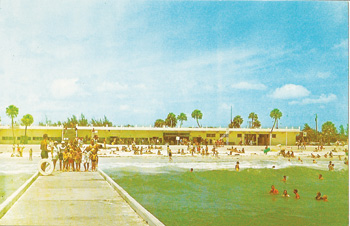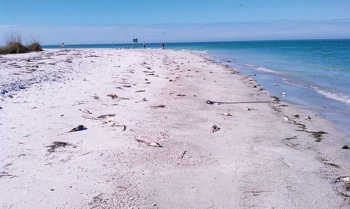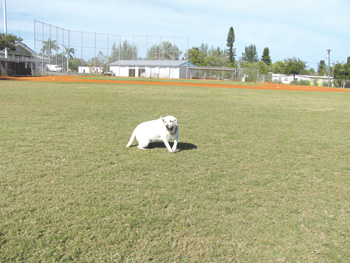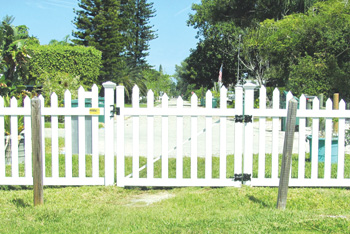Try to find a way to keep discarded mullet from washing up on local shorelines and get it into the hands of the hungry, and you're likely to wind up in a catch-22.
As reported in The Sun on Jan. 4, a plentiful harvest of mullet over the past few weeks filled Cortez fish house freezers to capacity, causing them to buy only female mullet, which carry high-dollar red roe, an Asian delicacy.
As a result, fishermen tossed males with less valuable white roe overboard. If it's done right, at sea, some survive, but in a race to get to the fish house first, some fishermen waited until they docked to separate the fish, when the fish were already dead, then took the male carcasses offshore and dumped them.
The dead fish washed up on Anna Maria Island and Longboat Key Gulf beaches and in canals along the Intracoastal Waterway, according to the county's beach raker and elected officials who received a boatload of complaints from residents and tourists.
The logical question is: Why can't the unwanted mullet go to a food bank instead?
Catch-22
The answer is complicated, and, like many things, boils down to money.
The Salvation Army in Bradenton is short on volunteers and does not have the staff – or even fillet knives – to clean and fillet the fish, but they would cook it up and serve it if it was cleaned and filleted, a cook said.
All Faiths Food Bank in Sarasota is a warehouse with no kitchen, and, therefore, has no place to clean the fish, and there is no room in the warehouse to store fish, spokesman Jim Swinford said.
"Mullet has to be gutted and cleaned right away, and we don't do processing here," said Cindy Sloan, of the Food Bank of Manatee.
Roser Pantry in Anna Maria does not accept fresh food, only non-perishables.
"I would love to have them, but I don't have the ability to clean them and cook them," said Penny Goethe of Our Daily Bread in Bradenton.
Even if a food bank was willing to take the fish, there are problems on the supply side.
The fish have to be continuously kept on ice, and ice costs money.
Kim McVey, of Cortez Bait and Seafood, said the fish house was buying ice daily during the mullet run. Freezer space at the fish house was at a premium, reserved for female mullet.Fishermen wait all year for the uncertain and often short window of opportunity when mullet roe is plentiful to sell the high-dollar catch. They aren't likely to take valuable time in the busy season to handle low-value fish, said Karen Bell of A.P. Bell Fish Co.
And even if they were willing, Bell Fish was too busy to transport the unwanted fish elsewhere, she said, adding that they ran at full capacity for weeks and even had to cut off the purchase of red mullet.
How they do it up north
The problem isn't just in Cortez.
A study by the Fisheries and Aquaculture Department of the United Nations Food and Agricultural Organization states that discarding fish is a worldwide "waste of fishery resources and potential food."
A study by the U.S. Secretary of Commerce on donating bycatch to food banks suggests "creating more interest and opportunity for expanded donation programs involving fish species that currently are not retained due to market or other economic considerations."
Alaska has figured out a solution, with a "bycatch to food bank" program.
Boats fishing in the Bering Sea donate their unwanted bycatch to Bainbridge Island, Wash.-based SeaShare, a branch of the Feeding America food bank network.
SeaShare has organized a not-for-profit group of fishermen, fish houses, processors, packagers, and storage and transportation companies who donate their services. To offset the rest of the cost to get the fish to the hungry, SeaShare obtains financial donations.
The group has served more than 150 million meals since 1994, said SeaShare director Jim Harmon, who vacationed on Anna Maria Island in the 1960s with his parents.
At the request of The Sun, the Tampa Bay branch of Feeding America is looking into whether the program could work locally.
In places without a solid fishing industry infrastructure, getting whole fish to food banks may not work, Harmon said.
But mullet also can be ground up as fish meal and used as food in aquaculture, he said. Aquaculture farms operate north and south of Cortez, in Ruskin in Hillsborough County and at Mote Marine Laboratory's farm in Sarasota County.
SeaShare had to obtain special federal permits to allow fishermen in the Bering Sea to keep unwanted bycatch for charitable donations, as federal law requires them to discard bycatch.
In Florida, there's no such red tape. The Florida Fish and Wildlife Conservation Commission (FWC) – not the federal government – has jurisdiction over the mullet fishery, said the FWC's Aaron Podey, and it does not prohibit donating bycatch to food banks as long as the fish are landed at a licensed dealer and a trip ticket is reported for each load.
Dumping illegal
The FWC is approaching the problem from another angle - law enforcement.
In response to numerous complaints about discarded mullet, the FWC recently asked its legal staff to clarify the fisheries regulations for its law enforcement officers, who earlier this month told The Sun that the dumping was not illegal.
A Florida statute and a provision in the Florida Administrative Code prohibit dumping dead fish, Podey said.
"If you use any part of it, such as the roe, you have to land it (at the dock) in whole condition," he said. "If you're not going to use any of it, you must return it to the water immediately, alive and unharmed."
Fishermen who throw out dead male mullet violate the regulation, he said, adding that throwing out female carcasses after the roe is removed
probably is not a violation.
Wildlife officers use their discretion, he said, which is particularly wide on mullet, because it has no commercial limit. The last stock assessment of the species in 2008 showed they were exceeding management goals, Podey said, adding, "This is a fishery in good shape."
A sin and a shame
Too good, this year.
Dead fish generated so many complaints, including from tourists afraid that red tide had killed the fish, that Manatee County Commission Chair Carol Whitmore and Holmes Beach Commission Chair David Zaccagnino formed an informal committee to investigate ways to use the excess fish.
Besides looking into food banks, they hope to work with prisons, which may have the capacity, equipment and staff to handle the fish.
If nothing else, a landscaping company might use the mullet as fertilizer for trees and bushes, as the early settlers of Cortez did.
Meanwhile, there's good news for coastal residents and beachgoers who are sick of smelling dead fish, although it's bad news for fishermen – the mullet run has slowed to a walk.
With more mullet this roe season than anyone can remember seeing in their lifetime, a run like this is unlikely to happen again anytime soon, Bell said.
Still, any dead fish thrown overboard is, as one Cortez fisherman said, "a sin and a shame."
Anyone with ideas or dollars to help get surplus seafood to hungry people, hungry fish or hungry plants, contact Whitmore at 941-748-4501 or carol.whitmore@mymanatee.org.





